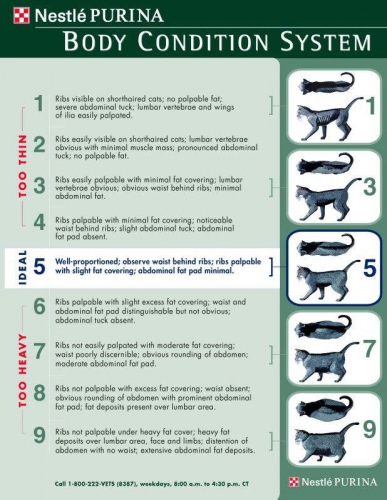Is Your Pet Overweight or Obese?
Not only is obesity an escalating global problem for humans, but recent studies have shown that 34-41% of companion animals are overweight or obese (1). Obesity is associated with a number of diseases in dogs and cats, including orthopedic problems, endocrine disease (Diabetes, hyperthyroidism, and Cushing’s disease), oral cavity disease, pancreatitis (inflammation of the pancreas), urinary tract disease, hypotension (decreased blood pressure), heart disease, lung dysfunction, and increased incidence of certain cancers (1). Many owners believe that giving lots of treats and table scraps is part of loving their pet. However, by allowing our pets to be overweight or obese, we are significantly decreasing their lifespan.
Canine Body Condition Score System
This is a body condition score system used by most veterinarians around the country to assign body condition scores to dogs. Use the pictures and the descriptions to determine your own dog’s body condition score. A score of 4 or 5 is considered “ideal”. If you find that your pet is not the ideal body condition, please contact us for a nutritional consult. Your veterinarian can provide many helpful tips and resources to keep your dog at a healthy weight, including dietary and lifestyle management. Obesity is a very preventable disease! Don’t let your dog develop one of the health problems listed above due to obesity. Maintaining your dog at an ideal body weight could increase their lifespan by 2-3 years! Please contact us if you have any questions regarding your dog’s weight.
Feline Body Condition Score System

This is the body condition score system used by veterinarians around the country to assign a body condition score to cats. Use the pictures and the descriptions in the chart above to determine the body condition score of your cat. A score of 4 or 5 is considered ideal body condition. If you find your cat is not an ideal body condition, please contact us for a nutritional consult. Your veterinarian can provide a lot of helpful tips for keeping your cat healthy, including dietary and lifestyle management. Don’t let your cat develop health problems due to obesity, including diabetes. Please contact us if you have any questions or concerns regarding your cat’s weight.
Resources
1. German, Alexander James. “Obesity Biology and Management” in Ettinger, Steven J. (Ed). Textbook of Veterinary Internal Medicine: Diseases of Dogs and Cats. St. Louis, MO: Saunders, 2010. p 121-124.

